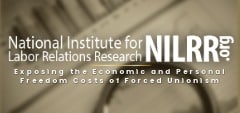Big Labor Payback not Paying Enough Back
Union bosses are becoming disillusioned with President Obama’s actions. Steve Mufson and Tom Hamburger have the story in the Washington Post.
Labor leaders who have spent months lobbying unsuccessfully for special protections under the Affordable Care Act warned this week that the White House’s continued refusal to help is dampening union support for Democratic candidates in this year’s midterm elections.
Leaders of two major unions, including the first to endorse Obama in 2008, said they have been betrayed by an administration that wooed their support for the 2009 legislation with promises to later address the peculiar needs of union-negotiated insurance plans that cover millions of workers. Their complaints reflect a broad sense of disappointment among many labor leaders, who say the Affordable Care Act has subjected union health plans to new taxes and mandates while not allowing them to share in the subsidies that have gone to private insurance companies competing on the newly created exchanges.
After dozens of frustrating meetings with White House officials over the past year, including one with Obama, a number of angry labor officials say their members are far less likely to campaign and turn out for Democratic candidates in the midterm elections.
“We want to hold the president to his word: If you like your health-care coverage, you can keep it, and that just hasn’t been the case,” said Donald “D.” Taylor, president of Unite Here, the union that represents about 400,000 hotel and restaurant workers and provided a crucial boost to Obama by endorsing him just after his rival Hillary Rodham Clinton had won the New Hampshire primary.
A White House spokeswoman declined to comment on the union leaders’ claims that they were misled. A person familiar with Obama’s meeting with the labor chiefs said he “listened to the group’s concerns with empathy” but explained that the law would not permit the administration to take the steps they requested.
Obama administration officials and some outside experts said that if the unions got their way, people enrolled in their plans would be indirectly getting two tax benefits while most Americans get only one.
In December, Labor Secretary Thomas Perez proposed some changes for plans that cover unionized and other workers.
Many labor leaders hope to make headway in talks with the administration and have opted to withhold sharp criticisms of the White House. AFL-CIO officials declined to comment, referring reporters to a resolution passed at the organization’s last convention that echoed the policy concerns expressed in the Reid-Pelosi letter.
The rejections by the White House follow previous disappointments for the labor movement, which poured money into pro-Obama campaigns in 2008 and 2012 and deployed millions of grass-roots volunteers motivated largely by their support for Obama’s push to bring about near-universal health insurance. Another major goal of the labor movement – card-check legislation to make it easier for workers to form unions – failed to win support after what many labor officials thought was a lackluster effort by the White House.
Union officials expect the health-care controversy to intensify a raging debate within the labor movement over how deeply labor should invest in Democratic Party candidates.
Already, the Laborers’ International Union has established warm relations with one potential GOP presidential candidate, Chris Christie, endorsing his 2013 reelection as New Jersey’s governor. The union gave $300,000 to the Republican Governors Association, now headed by Christie. And there have been preliminary discussions between labor officials and aides to the governor over a possible appearance by Christie at a union convention.

